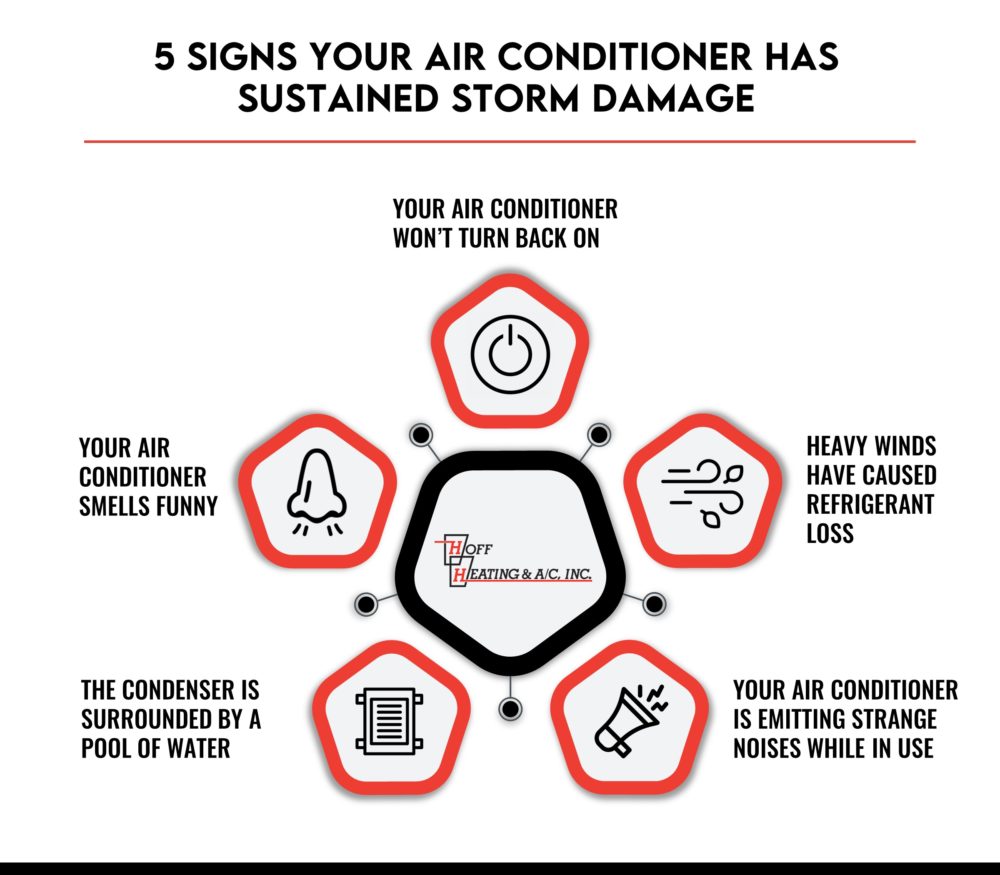5 Signs Your Air Conditioner Has Sustained Storm Damage
Air conditioners are designed to withstand constant exposure to the elements and nearly all weather conditions. However, many severe weather events can certainly take their toll. Whether your air conditioner has been subjected to heavy wind, rain, hail, dust, or snow, making sure it’s okay is important. Catching and repairing storm-related damages early on can prevent energy waste, needless wear, and outright failure. Following are five signs your home cooling system has sustained storm damage along with several tips for putting things aright.
1. Your Air Conditioner Won’t Turn Back on
Severe storms often cause the power to go out. In most instances, if your HVAC was on before the power went off, it will automatically show signs of life once the power is restored. However, if it does not, this could mean that the equipment has sustained damages as the result of a power surge. Fortunately, your air conditioner should be well-protected against power surges by the circuit breaker. You may simply need to reset it. If the AC system doesn’t power up after the breaker has been reset, schedule HVAC repair services right away.
2. Heavy Winds Have Caused Refrigerant Loss

3. Your Air Conditioner Is Emitting Strange Noises While in Use

Cleaning out your condenser after a major storm may be something that you can do on your own. Most condenser enclosures are easy to open, and most owner’s manuals offer detailed and easy-to-understand cleaning instructions. However, if the amount of debris at the interior of your AC’s condenser is substantial, or if you aren’t comfortable doing this work, schedule AC maintenance service instead. Professional cleanings tend to be far more thorough, and when licensed providers are in charge of this work, there’s no risk of accidentally voiding your warranty. One thing you can certainly do on your own is to clear away any large items that have been blown against the condenser enclosure. Removing branches, leaves, and other storm debris will keep this component from overheating. It will also ensure optimal airflow. The condenser should always have between 12 and 18 inches of clearance on all sides or more.
4. The Condenser Is Surrounded by a Pool of Water

If your condenser is sitting in a standing pool of water following a storm or after a heavy snow-melt, turn the air conditioner off at the circuit breaker right away. Alert everyone on the property to stay away from the area. If your yard isn’t gated, think about putting up a warning sign. You’ll need to take care of any drainage issues that exist before attempting to have the unit cleared, inspected, and repaired. Once the standing water has drained, dried up, or abated, your HVAC technician can come in and do the rest. Hiring professionals to clear up drainage issues after the storm will eliminate the electrical hazard, protect the foundation of your home, and ensure that water doesn’t pool around this important outdoor component during future storms.
5. Your Air Conditioner Smells Funny

If you notice a foul smell coming from your indoor air registers or vents several days after a storm, you may have an entirely different problem on your hands. During times of severe weather, small animals living around your home may make an effort to find shelter in your HVAC ductwork. Even fairly small-sized openings can allow rodents, raccoons, and other pests in. Once they enter these systems, animals sometimes have a hard time finding their way out. Moreover, by the time that they’ve entered during a storm, they may already be seriously injured or ill. When pests die in hidden areas of the HVAC system, their decomposing bodies permeate the house with a putrid odor. The longer that this problem is left unsolved, the more pervasive the resulting stench will become, and the more dangerous the issue will be for the health of those in your home. The good news is that this is also a problem that a trusted HVAC company can help with. HVAC professionals can locate the offending carcass, remove it, and disinfect and deodorize all affected sections of the ductwork.
At Hoff Heating & AC, we offer a vast range of heating and cooling repair, installation, and maintenance services for property owners throughout O’Fallon, MO, and the surrounding region. We also provide HVAC services for new constructions, geothermal services, and a number of top-rated HVAC products. If your home cooling system has sustained damage during a recent storm or you just need to schedule a maintenance visit, call us today.


